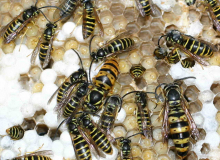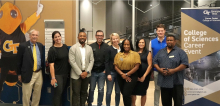
A Georgia Tech professor and his team are cracking the code on the Institute's most recognizable social insect.

The Fellowship will support the Freeman lab as it The Freeman lab investigates how mountain biodiversity persists in a warming world.

From navigating unexpected job pathways to the importance of networking and soft skills, College of Sciences alumni shared insights and advice about leveraging a Georgia Tech education into a successful career at the What Can I Do With My Georgia Tech Sci

ARCS Foundation Atlanta awarded a total of $117,500 to 15 Ph.D. students who show exceptional promise of making a significant contribution to the worldwide advancement of science and technology.


